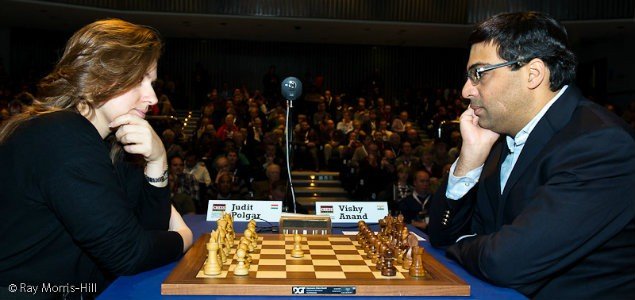Adaa: Viswanathan Anand's Inspirations - Grandmaster Thanks to Mom, Mind Master Thanks to Aruna
Viswanathan Anand is one of the first names that comes to mind when one thinks about chess grandmasters and world champions. He became India’s first grandmaster at 18 years old in 1988, and he’s been making his mark on chess history since. Who are some of the people who helped him along the way?
By Her News columnist Adaa Rahul
Courtesy of ChessBase - Anand through the eyes of Aruna - From 1996 to 2020!
Viswanathan Anand is one of the first names that comes to mind when one thinks about chess grandmasters and world champions. He became India’s first grandmaster at 18 years old in 1988, and he’s been making his mark on chess history since. He’s written the book, “Mind Masters” divulging his emotional struggle, his journey while strengthening his mental game, and discussing the people and practices that have helped him get to the extraordinary place he is.
Born in Chennai, India (Formerly known as Madras), Anand learnt chess at the age of six, from his mother, Susheela Viswanathan. She was one of the driving forces behind his mastery of chess, and she imbued her son with her own passion for the game. Anand developed a practice of jotting down notes about a match and recording his moves every time he played, a habit his mother cultivated in him and continues even today. Anand and his mother shared a special relationship, and it was her dedication to his development that took him all around India to play in tournaments, and eventually, all around the world. As Anand told Times of India, “She was always there for me (Nandanan, 2009).” His family continues to support him, with his wife, Aruna, managing many aspects of his career, and going to tournaments with him despite his hectic travel schedule, which she also took charge of. In an interview with Chessbase, Aruna said that, “I feel very proud that I could play a significant role in a lot of these World Championship matches at least at the negotiation and execution stage.”
Anand and his wife have a son called Akhil, and despite all the couple’s responsibilities and fame, Anand makes the time to be there for his son. Helping with Akhil’s homework and serving as his playmate, Anand, who helps with Akhil’s homework and serves as his playmate, is described affectionately by his wife when she says that, “...Anand as a father is the most beautiful role I have seen him in.” Aruna supports Anand in innumerable ways, both in parenting and in his career, but it’s not only family that have helped him throughout his life. He’s made many friends and allies while traveling to new places and attending chess events, for example Frederic Friedel as well as Mauricio and the late Nieves Perea, who are known as Anand’s Spanish parents. As Anand told ESPN, they, “...Basically almost adopted me….” Mauricio mentored him, and the couple let him stay with them for long stretches of time. Viswanathan Anand’s name might never have been as significant as it is in chess today if not for the family and friends who helped him along his journey.
Viswanathan Anand and Judit Polgar - courtesy of Chess.com
Anand has played many legendary games of chess, but there’s a lot that leads up to those tense moments at a tournament, both mental and physical preparation. Important events are held across the globe, and there’s almost always significant travel involved when getting to a tournament. In fact, Anand has been to 64 countries while competing in chess events. With each progression, from plane to hotel room to game, the pressure is mounting. As Anand put it in an interview with Scroll.in, “You catch your flight and you know that things are getting slightly more serious, then you arrive at the hotel, and that’s one level up. In the next stage, you’ll see other participants roaming around the hotel and then it’s becoming a bit more real… And then the final level is when the game starts and then you know, it’s full tension and everything.”
However, there is far more prep just before the game beyond long, arduous flights. Anand works extensively before playing to get into the right frame of mind, which he described in the same interview with Scroll.in, saying that, “I think I approached it as an interesting journey. Everything was new and there was no template to follow or something. I was going to new countries, new experiences….” Of course, after close to 50 years of playing, he’s encountered opponents who have been aggressive, showing an angry attitude starkly different to Anand’s own while or after playing. He’s had to pay more attention to the phycological, emotional aspects of high-level chess, stating that, “...You eventually meet people who are quite aggressive to you... you can’t ignore them. And then you have to start thinking, ‘Well, how do you get ready to play against them?’” In Anand’s autobiography, “Mind Master,” he mentioned attempting to work with a psychologist, something he later stopped, turning instead to his wife Aruna. Despite the challenges Anand has faced during his career, Anand says that his way of viewing chess hasn’t changed immensely; he still looks at it as an adventure, focuses on himself, and plays his absolute best every time he sits down to compete.
Viswanathan Anand and son Akhil, courtesy of X account - vishy64theking


